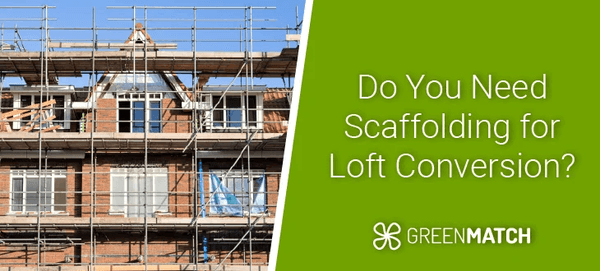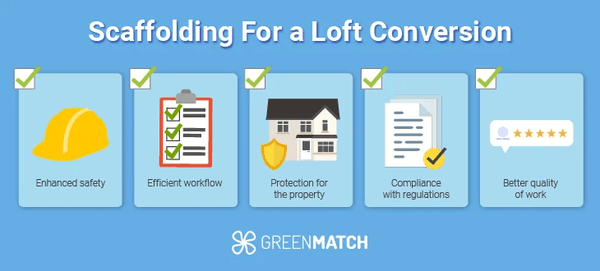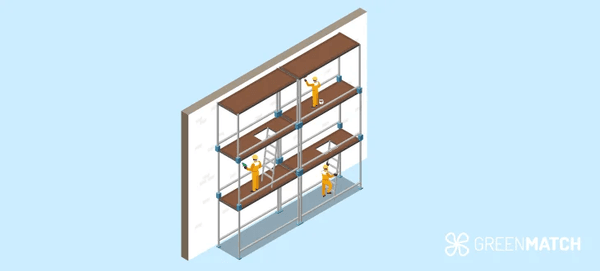Answer these simple questions and we will find you the BEST prices
Which type of solar quotes do you need?
It only takes 30 seconds
100% free with no obligation

Get Free quotes from loft conversion specialists near you

Save money by comparing quotes and choosing the most competitive offer

The service is 100% free and with no obligation
- GreenMatch
- Loft Conversion
- Loft Conversion Scaffolding
Do You Need Scaffolding for a Loft Conversion?


- Scaffolding is needed for loft conversions that involve significant structural changes, like dormer or mansard conversions.
- Scaffolding for a loft conversion typically costs £250 to £400 per week in the UK. For an 8-week project, this can total £2,000 to £3,200.
- Costs vary depending on property size, height, and location. It’s advisable to get multiple quotes for accurate pricing.
Planning a loft conversion can be challenging, especially when you're unsure if scaffolding is necessary. Many homeowners struggle with understanding whether their specific project requires scaffolding, how much it will cost, and what benefits it offers.
Without clear information, making informed decisions can be difficult.
In this article, we’ll clarify everything you need to know about loft conversion scaffolding. We’ll discuss when scaffolding is typically needed, how it impacts your budget, and why it’s crucial for the safety and efficiency of your project.
Ready for your loft conversion? Instead of spending hours researching and calling installers, fill out our quick 30-second form to get up to three free, no-obligation quotes from trusted local experts, tailored to your project needs.
Click below to begin!
- Describe your needs
- Get free quotes
- Choose the best offer
It only takes 30 seconds



Is scaffolding for loft conversion necessary?
In some cases, scaffolding is essential for an attic conversion, while in others, it might not be necessary. Scaffolding is typically required in cases where significant structural changes are being made to your property's roof or exterior walls.
This includes scenarios where access to higher levels is needed to carry out construction work safely and efficiently.
When scaffolding is needed
Here are some common situations where scaffolding is required:
- Dormer loft conversions: This type of conversion often requires scaffolding because it involves extending the existing roof to create additional space. Scaffolding provides safe access to the roof area where the dormer will be built, ensuring that the construction team can work securely.
- Mansard loft conversions: Similar to dormers, mansard conversions involve altering the structure of the roof significantly. Scaffolding is necessary to support workers and materials during the roof modification process, as the entire roof shape is often changed.
- Hip-to-gable loft conversions: In a hip-to-gable conversion, the hipped end of the roof is replaced with a gable end, requiring extensive work at height. Scaffolding is essential to provide a safe working platform and to protect the property during construction.
When scaffolding is not needed
In some cases, scaffolding may not be required, particularly for simpler loft conversions that involve minimal external changes. Here are a few types of conversions where scaffolding might not be necessary:
- Velux loft conversions: If your loft conversion only involves installing roof windows without making significant structural changes, scaffolding might not be needed. Velux windows loft conversion can often be done from within the roof space, eliminating the need for external scaffolding.
- Internal loft conversions: Conversions that focus solely on utilising the existing loft space without altering the roof or exterior walls usually do not require scaffolding. These projects can often be completed without any external access, depending on the specifics of your property.
Benefits of scaffolding

Scaffolding for a loft conversion can still be useful even in projects that are not required, according to Eloft Conversions. It may help workers access different parts of the home more easily, speeding up the overall construction work.
Here’s why investing in scaffolding is a wise decision:
Enhanced safety
Scaffolding provides a stable and secure platform for workers to perform tasks at height, reducing the risk of falls or accidents. It allows for safe access to all parts of the roof and exterior walls, ensuring that the construction team can work efficiently without compromising safety.
Efficient workflow
Scaffolding facilitates a more efficient workflow by providing easy access to elevated areas of your property. Workers can move around the site more freely, carry materials, and use tools without the limitations that ladders or other temporary solutions impose. This efficiency can lead to faster project completion, saving time and potentially reducing labour costs.
Protection for the property
Scaffolding not only supports workers but also protects your property during the construction process. It can be fitted with protective sheeting or netting to prevent debris from falling and causing damage to your home or surrounding areas.
This protection is especially important in loft conversions that involve significant roof modifications, where loose materials and dust are common.
Compliance with regulations
In the UK, building regulations often require the use of scaffolding for certain types of loft conversions, particularly those involving structural changes or work at height.
Using scaffolding helps ensure that your project complies with these regulations, avoiding potential legal issues and ensuring that your conversion is carried out to a high standard.
Better quality of work
Scaffolding provides a stable working environment, allowing tradespeople to perform tasks with greater precision and care. Whether it’s installing roof windows, applying exterior finishes, or constructing a loft conversion dormer, the stability offered by scaffolding can lead to a better overall quality of work.
This can have long-term benefits for the durability and appearance of your loft conversion.
Choose a scaffolding company located near your site to reduce the carbon footprint associated with transporting the materials. This also supports local businesses, which can have additional environmental and community benefits. Inquire if the scaffolding company has any green initiatives, such as using low-emission vehicles or minimising waste during setup and dismantling.
It's essential to compare quotes from local loft conversion companies before deciding on a contractor. This step not only helps you find the best value for your investment but also allows you to assess the quality of services each company offers.
By obtaining multiple quotes, you can compare prices, timelines, and the specific services included, ensuring that you select a contractor who meets your budget and expectations without compromising on quality.
Taking the time to compare quotes will give you confidence in your choice, ensuring that your loft conversion is completed to the highest standard, on time, and within budget.
Fill out our quick 30-second form to receive up to three no-obligation, free quotes from our network of trusted local installers specifically tailored to your project needs.
Click below to begin!
- Describe your needs
- Get free quotes
- Choose the best offer
It only takes 30 seconds



Scaffolding cost for loft conversion
On average, the cost of scaffolding for a loft conversion in the UK ranges from £250 to £400 per week. This rate can fluctuate depending on the complexity of the project and the size of your property.
Scaffolding is often priced per square metre (m2) per week. The average cost is approximately £22.50 per m2 per week. This rate typically includes the setup, rental, and dismantling of the scaffolding.
Here is the typical scaffolding cost for a loft conversion ranked by property type:
| Property type | Approximate weekly cost | Estimated total cost (8 weeks) |
|---|---|---|
| Small terraced house | £250–£300 | £2,000–£2,400 |
| Semi-detached house | £300–£350 | £2,400–£2,800 |
| Detached house | £350–£400 | £2,800–£3,200 |
| Large detached house | £400–£500 | £3,200–£4,000 |
Several factors can influence the weekly cost of scaffolding for your loft conversion:
- Property size and height: Larger homes and taller properties require more scaffolding, which increases the weekly cost. The height of your property also impacts the amount of scaffolding needed.
- Project duration: The longer your project takes, the higher your overall scaffolding costs will be, as you’ll be paying a weekly rental fee. Efficient project management can help minimise these costs.
- Accessibility: If your property is difficult to access or requires special equipment to erect scaffolding, the cost may increase. This includes properties on sloped ground or those with limited space around them.
- Location: Scaffolding costs can vary depending on your location in the UK. Urban areas, particularly in London, may have higher prices due to demand and logistical challenges.
Scaffolding for a loft conversion can usually be installed within 1 to 2 days. The installation time can vary depending on the size of the property and the complexity of the scaffolding setup.
Does your loft conversion need scaffolding?

Whether your loft conversion requires scaffolding depends on the specific details of your project.
Scaffolding is necessary when significant structural changes are involved, such as extending the roof or altering the exterior walls. However, in some cases, simpler loft conversions might not require scaffolding at all.
To make an informed decision, it’s crucial to consult with a builder or loft conversion specialist. They will assess your property, the scope of the work, and the safety requirements to determine if scaffolding is essential for your project.
Their expertise will help ensure that the conversion is carried out efficiently, safely, and in compliance with UK building regulations.
To get the best results for your loft conversion, it’s advisable to gather multiple quotes from different loft conversion specialists. This will give you a clearer picture of the costs involved and whether scaffolding is necessary for your specific project.
Fill out our quick 30-second form to receive up to three no-obligation, free quotes from our network of trusted local installers specifically tailored to your project needs.
Click below to begin!
- Describe your needs
- Get free quotes
- Choose the best offer
It only takes 30 seconds



FAQ
Scaffolding is usually needed for loft conversions with major structural changes, like dormers or mansards. Simpler conversions, like Velux, may not require it. Consult a specialist to confirm.
Scaffolding for a loft conversion typically costs £250 to £400 per week in the UK. For an 8-week project, this can total £2,000 to £3,200. Costs vary depending on property size, height, and location. It’s advisable to get multiple quotes for accurate pricing.

Tania is an experienced writer who is passionate about addressing environmental issues through her work. Her writing aims to shed light on critical environmental challenges and advocate for sustainable solutions.
We strive to connect our customers with the right product and supplier. Would you like to be part of GreenMatch?

